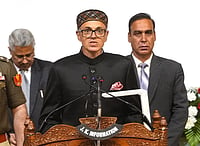IT'S strange that few people remember Jayaprakash Narayan, whose birthday on October 11 passed almost unnoticed. Yet, he gave India back its democracy, which Indira Gandhi had practically killed through her totalitarian methods—she gagged the press, detained one lakh people without trial and smothered effective dissent. On July 11, 1975, during those dark, Emergency days, JP wrote in his prison diary: "I had always believed that Mrs Gandhi had no faith in democracy, that she was by inclination and conviction a dictator."
'Now Nobody Comes Here'
...JP had lamented in his twilight years. Kuldip Nayar remembers India's last conscience-keeper.

Only a day earlier, he had sent a long letter to Mrs Gandhi written in the same vein. "Please do not destroy the foundations that the Fathers of the Nation, including your noble father, had laid down. There is nothing but strife and suffering along the path that you have taken. You inherited a great tradition, noble values and a working democracy. Do not leave behind a miserable wreck of all that. It would take a long time to put all that together again." But JP achieved the feat in 1977 when Indira Gandhi was defeated at the polls.
I recall my last meeting with JP at Jaslok Hospital in Bombay. A beam of afternoon sunlight stole through the half-closed Venetian blinds and I noticed that the broad face was etched with lines of fatigue and age—only, the eyes were alert with youthful enthusiasm. He spoke softly, like always, and talked of convening a meeting of intellectuals ("not a big one"), administrators, legislators and "those who want to create a new India" to suggest "some concrete steps". All this without making long speeches or entering into intellectual exercises. "Unfortunately, my health comes in the way," he said. But this didn't deter him from working towards his goal till the end.
Only a few days before his death, he sent a message to some people in Delhi, asking them to gather in Patna to consider the country's problems. Even while he fought for his life, he was conscious of the fact that the 'work' he had initiated was unfinished. His crusade: that the people should participate in government at all levels and articulate their opinion to such an extent that they influence government policies and decisions.
JP expected the Janata Party, which he had culled from different constituents in the Opposition, to implement his ideal of total revolution, so that the people would be the real masters. But before long, he realised that the instruments (or leaders) he had selected—those at the helm of affairs—didn't have faith in his scheme of things.
Once the Janata experiment was in place, JP said he was prepared to give the party "at least one year" to prove itself—after all "the Congress had 30 years". He was willing to give the Janata Party leaders some time because he was aware that most ministers had no experience, either administrative or political. He was even optimistic: "If they can do something, it will make an impact on the people and make them feel that change has taken place." Alas, in October 1977, after six months of Janata Party rule, he was disappointed with its performance. After all, this was not the role he had envisaged for the Janata Party leaders. As days went by, he was even more disillusioned. JP was already clamouring for new faces, preferably young, to come forward and join the political mainstream—and change the system that prevailed over every government and ideology.
"I have no faith in any 'ism'," he often said. "We in India must think of something new which would combine bread with liberty, nothing doctrinaire."
The split in the Janata Party caused him the greatest pain. He honestly believed, as he said in an interview, that "the opposition has combined and the Janata is now an alternative to the Congress." He tried to reason with the Janata leaders about the role their party had to play. He knew that some leaders in the Janata Party—Morarji Desai and Charan Singh in particular—did not care about his advice but he always told them to stay united and do "something" to better the people's lot. "Now nobody comes here," he lamented in October 1977, when few people called on him. Leaders were afraid to face him because he was the people's mirror. When he returned from the US after treatment, he enquired if there was anyone at Palam airport when the plane halted en route to Bombay. Only Purushottam Kaushik, then minister for civil aviation, had bothered to call on JP.
In many ways, JP's plight was similar to that of Mahatma Gandhi; both were ignored when the people struggling by their side came to power.
The last few months saw him withdrawing into his shell—he took the vow of silence in public. People who met him saw disappointment written all over his face. He never imagined that those leaders who swore in the name of democracy would fail the country when they were required to join hands to face the resurgence of authoritarianism.
Perhaps the only thing that kept JP going was his faith in the people. "They have been awakened," he said and "they will not accept dictatorship". JP filled the vacuum Mahatma Gandhi's death created in 1948. If Gandhiji had given the nation independence, JP restored democracy.
The leader of the masses held falsehood and opportunism in check and stood as a bulwark against strife, maybe something worse. He awakened the people to such an extent that they did not even have to look for leaders or a strongman. They had reached a stage where they could assert themselves. Now, nearly 18 years after his death, I wonder if I was right. Today, people are depressed at the way things are being run. Never have they felt so lonely. Who will stir the conscience of the nation? After Mahatma Gandhi they had Nehru, after Nehru they had Lal Bahadur Shastri, and then JP, but now who?





















